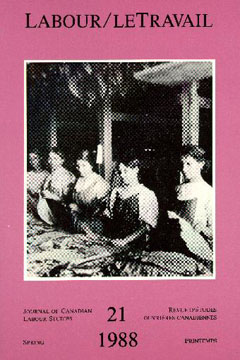Abstract
Organizing unorganized workers, particularly the growing number of women and young people in part-time jobs, is one of the major challenges for organized labour. The restructuring of the restaurant industry in the post-World War II period produced a work situation in which traditional workplace organizing strategies were rendered ineffective.
This paper explores the development of the interchangeable worker in the fast food sector of the industry and examines how a feminist approach to work, which stresses the links between paid work, family, and community, is a more appropriate model upon which to develop suitable strategies for dealing with this increasingly common workplace.
Resume
L'organization de la main d'oeuvre non-syndiqué, surtout celle du nombre croissant de travailleuses et de jeunes personnes dans les emplois à temps partiel, pose un défi primordial aux syndicats. La restructuration del'industrie de la restauration au lendemain de la Seconde Guerre mondiale engendra une situation de travail qui rendit inefficaces les stratégies d'organisation du milieu de travail traditionnel.
Le présent article explore l'évolution de la condition du travailleur et de la travailleuse dans le secteur de la restauration-minute. Cette monographie démontre comment une approche féministe à l'étude du travail, en insistant sur les liens entre le travail rémunéré, la famille et la collectivité, fournit un modèle plus adéquat sur lequel développer des stratégies aptes à la compréhension de ce milieu de travail de plus en plus répandu.
